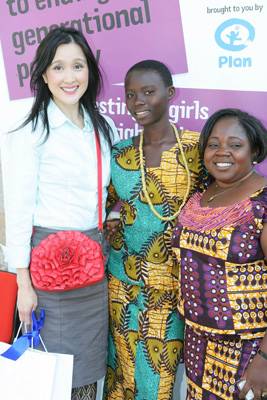Because I'm a Girl

Because I'm a Girl: The State of the World's Girls 2010
A new report has found that two of the global trends that are the most dynamic, fast-moving and exciting of the 21st century - cities and cyberspace - pose the greatest opportunities but also the greatest threats for the world's girls.'Because I am a Girl: The State of the World's Girls 2010' was today launched globally by leading international development agency, Plan. Titled 'Digital and Urban Frontiers: Girls in a Changing Landscape', the report presents new research and analysis of the threats and opportunities that girls face in the world's growing cities and through information and communications technologies.
The fourth installment of Plan's annual 'Because I am a Girl' series, argues that girls are the citizens who will be running our cities and shaping technology in the coming decades. It is these girls that need the skills and knowledge to build a better and safer world for everyone.
Despite all the threats that girls face in digital and urban spaces, the report finds that the best way to support their wellbeing and development - and to continue the fight against poverty - is to equip them with the skills to effectively and safely navigate the threats so they can make the most of the opportunities that are available to them.
This also requires that those in positions of power and authority do their utmost to remove the barriers that prevent girls making the most of these opportunities.
As in previous reports, this year's research demonstrates that removing the barriers to the opportunities for girls in cyberspace and urban areas will unlock their potential and play a key role in ending poverty and creating global prosperity.
Initial report findings reveal some of the immediate risks of cities and cyberspace on girls around the world. These include:
The report's findings are emphasised by the latest information from Plan's nine-year cohort study that is tracking the lives of 142 girls from nine countries from birth until their ninth birthday in 2015, when the Millennium Development Goals should have been reached.
Ian Wishart, Chief Executive of Plan in Australia, says that without fundamental investment in girls and young women and a genuine desire to encourage their participation in cities and cyberspace, they will both be at a disadvantage in the economy and at personal risk.
"Plan recognises that discrimination against girls and young women is one of the main underlying causes of poverty," said Mr Wishart. "Girls and boys have the same entitlements to human rights, but they face different challenges in accessing them. This lack of opportunity and care is unfair, as investing in girls has a powerful effect on a family and community's experience of poverty."
"As the father of two girls, I know full well the parental instinct to try to hide them away from the dangers of the world, and too often this instinct is highly magnified in the developing world, leading to such outcomes as early marriage, denial of freedom of movement and girls missing out on education.
"But locking girls away to 'protect' them from the threats also denies them access to the opportunities that can expand their world, supercharge their development and help lift them, their families, their communities and, indeed, whole countries out of poverty.
"Plan's 'Because I am a Girl' reports argue that investing in girls is the right thing to do and the smart thing to do, and that is most certainly the case when it comes to girls in urban areas and cyberspace," he said.
The 2010 Because I am a Girl campaign is asking Australians to sign a petition that calls upon the United Nations to declare September 22 as the International Day of the Girl. The day would formally acknowledge the importance and value of girls and increase the pressure on all countries to do what is needed to improve their lives.
.Australians can take action by visiting a dedicated website to sign a petition at www.becauseimagirl.com.au and help to bring worldwide attention to the need for greater investment in girls to help end generational poverty cycles.
Dangers of cities and cyberspace that are little researched or regulated that are detailed in the report include:
The reports also warn that six of the eight Millennium Development Goals - the goals set by the world's governments in 2000 to halve world poverty by 2015 - are unlikely to be achieved unless there is a greater international commitment to fight against gender discrimination.
For more information on Because I am a Girl and Plan visit www.becauseimagirl.com.au or call 13 75 26.
MORE





